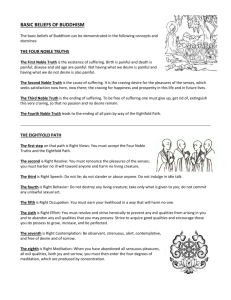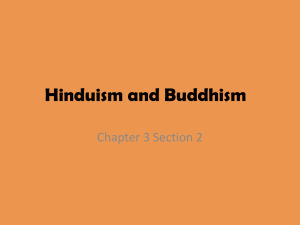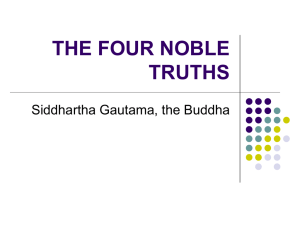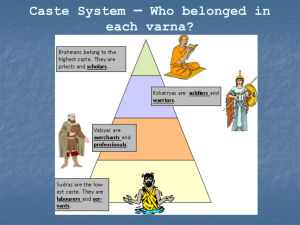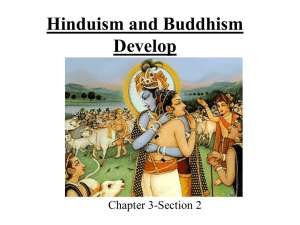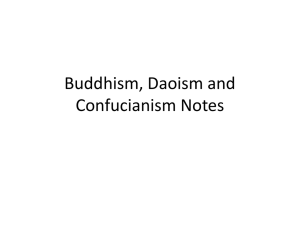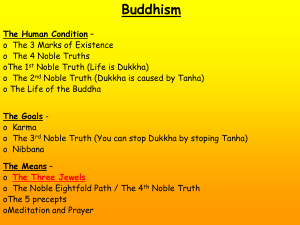File
advertisement
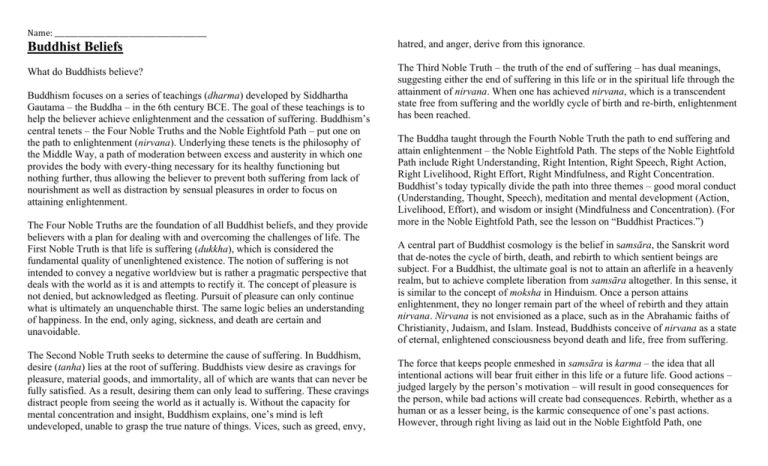
Name: _____________________________________________ Buddhist Beliefs What do Buddhists believe? Buddhism focuses on a series of teachings (dharma) developed by Siddhartha Gautama – the Buddha – in the 6th century BCE. The goal of these teachings is to help the believer achieve enlightenment and the cessation of suffering. Buddhism’s central tenets – the Four Noble Truths and the Noble Eightfold Path – put one on the path to enlightenment (nirvana). Underlying these tenets is the philosophy of the Middle Way, a path of moderation between excess and austerity in which one provides the body with every-thing necessary for its healthy functioning but nothing further, thus allowing the believer to prevent both suffering from lack of nourishment as well as distraction by sensual pleasures in order to focus on attaining enlightenment. The Four Noble Truths are the foundation of all Buddhist beliefs, and they provide believers with a plan for dealing with and overcoming the challenges of life. The First Noble Truth is that life is suffering (dukkha), which is considered the fundamental quality of unenlightened existence. The notion of suffering is not intended to convey a negative worldview but is rather a pragmatic perspective that deals with the world as it is and attempts to rectify it. The concept of pleasure is not denied, but acknowledged as fleeting. Pursuit of pleasure can only continue what is ultimately an unquenchable thirst. The same logic belies an understanding of happiness. In the end, only aging, sickness, and death are certain and unavoidable. The Second Noble Truth seeks to determine the cause of suffering. In Buddhism, desire (tanha) lies at the root of suffering. Buddhists view desire as cravings for pleasure, material goods, and immortality, all of which are wants that can never be fully satisfied. As a result, desiring them can only lead to suffering. These cravings distract people from seeing the world as it actually is. Without the capacity for mental concentration and insight, Buddhism explains, one’s mind is left undeveloped, unable to grasp the true nature of things. Vices, such as greed, envy, hatred, and anger, derive from this ignorance. The Third Noble Truth – the truth of the end of suffering – has dual meanings, suggesting either the end of suffering in this life or in the spiritual life through the attainment of nirvana. When one has achieved nirvana, which is a transcendent state free from suffering and the worldly cycle of birth and re-birth, enlightenment has been reached. The Buddha taught through the Fourth Noble Truth the path to end suffering and attain enlightenment – the Noble Eightfold Path. The steps of the Noble Eightfold Path include Right Understanding, Right Intention, Right Speech, Right Action, Right Livelihood, Right Effort, Right Mindfulness, and Right Concentration. Buddhist’s today typically divide the path into three themes – good moral conduct (Understanding, Thought, Speech), meditation and mental development (Action, Livelihood, Effort), and wisdom or insight (Mindfulness and Concentration). (For more in the Noble Eightfold Path, see the lesson on “Buddhist Practices.”) A central part of Buddhist cosmology is the belief in samsāra, the Sanskrit word that de-notes the cycle of birth, death, and rebirth to which sentient beings are subject. For a Buddhist, the ultimate goal is not to attain an afterlife in a heavenly realm, but to achieve complete liberation from samsāra altogether. In this sense, it is similar to the concept of moksha in Hinduism. Once a person attains enlightenment, they no longer remain part of the wheel of rebirth and they attain nirvana. Nirvana is not envisioned as a place, such as in the Abrahamic faiths of Christianity, Judaism, and Islam. Instead, Buddhists conceive of nirvana as a state of eternal, enlightened consciousness beyond death and life, free from suffering. The force that keeps people enmeshed in samsāra is karma – the idea that all intentional actions will bear fruit either in this life or a future life. Good actions – judged largely by the person’s motivation – will result in good consequences for the person, while bad actions will create bad consequences. Rebirth, whether as a human or as a lesser being, is the karmic consequence of one’s past actions. However, through right living as laid out in the Noble Eightfold Path, one generates liberating karma, which eventually leads to enlightenment. Once one has reached nirvana, one ceases to generate karma, thus removing oneself from the cycle of rebirth. Buddhists agree that the highest realm of rebirth is to be a human being. It is the highest realm because it offers the opportunity to achieve enlightenment. Buddhists believe that given the sheer number of living things, to be born a human being is a precious chance at spiritual perfection, a rare opportunity that a person should not forsake. Broadly speaking, Buddhism affirms that the potential for awakening and perfection is present in every human being and that realizing this potential is a matter of personal effort. Denominational differences The two major branches of Buddhism today – Mahayana (Sanskrit for “the Great Way”) and Theravada (“the Teaching of the Elders”) – possess differing beliefs regarding humanity’s potential for enlightenment, the role of enlightened beings, the nature of the Buddha himself (saint or savior), and the way to escape the cycle of death and rebirth. Mahayana Buddhism is comprised of a diverse group of schools with a core of certain shared beliefs. Mahayana Buddhists hold that an individual who achieves enlightenment has not yet reached the pinnacle of his spiritual quest; those who reach this state of perfect awakening are called to become a bodhisattva – an awakened being who guides others on the path to awakening until all of humanity has attained nirvana. In-deed, Mahayana teaches that all beings are destined to eventually gain enlightenment. An outgrowth of the Mahayana emphasis on the guidance of bodhisattvas is the belief – manifested in diverse ways between different schools – in the supernatural powers of supremely enlightened beings known as Buddhas. Mahayanists often believe that Buddhas can assist one in the quest to spiritual perfection long after the physical death of that particular Buddha. This belief developed into Devotional Buddhism, in which a person devotes oneself to a Buddha and remains mindful of him and his teachings in order to be granted salvation by the Buddha’s grace. As such, some Mahayanists view Buddhas essentially as deities. Devotional Buddhism minimized the mental rigors of meditation in favor of the more accessible practice of personal devotion to a Buddha. Because of the denomination’s historical willingness to incorporate preexisting belief systems as it spread across East Asia, some Mahayana schools believe in a variety of supernatural beings and deities that play various, often minor roles in their cosmologies. Theravada Buddhism has kept its system of beliefs considerably more contained. In Theravada, attaining enlightenment is a personal quest that cannot effectively be furthered by others, Buddhas or otherwise. Be-cause of this belief, those who do achieve nirvana have no responsibility to help others along the path to enlightenment; their journey is complete. Another consequence of the view of enlightenment as a personal matter is the absence of devotional worship in Theravada Buddhism. Every individual is responsible for his or her own salvation, which requires great personal effort. Thus, enlightenment is not guaranteed or preordained for anyone. “The Sermon at Benares” by Siddhartha Gautama Now, this, O bhikkhus, is the noble truth concerning suffering: Birth is attended with pain, decay is painful, disease is painful, death is painful. Union with the unpleasant is painful, painful is separation from the pleasant; and any craving that is unsatisfied, that too is painful. In brief, bodily conditions, which spring from attachment, are painful. This, then, O bhikkhus, is the noble truth concerning suffering. Now this, O bhikkhus, is the noble truth concerning the origin of suffering: Verily, it is that craving which causes the renewal of existence, accompanied by sensual delight, seeking satisfaction now here, now there, the craving for the gratification of the passions, the craving for a future life, and the craving for happiness in this life. This, then, O bhikkhus, is the noble truth concerning the origin of suffering. Now this, O bhikkhus, is the noble truth concerning the destruction of suffering: Verily, it is the destruction, in which no passion remains, of this very thirst; it is the laying aside of, the being free from, the dwelling no longer upon this thirst. This, then, O bhikkhus, is the noble truth concerning the destruction of suffering. Now, this, O bhikkhus, is the noble truth concerning the way which leads to the destruction of sorrow. Verily, it is this noble eightfold path; that is to say: Right views; right aspirations; right speech; right behavior; right livelihood; right effort; right thoughts; and right contemplation. This, then, O bhikkhus, is the noble truth concerning the destruction of sorrow. Buddhist Beliefs Directions: In the boxes, write some of the attributes associated with each of these truths. The Noble Truth The First Noble Truth Life is Suffering By the practice of loving-kindness, I have attained liberation of heart, and thus I am assured that I shall never return in renewed births. I have even now attained Nirvana. The Second Noble Truth Suffering is due to attachment The Third Noble Truth Attachment can be overcome The Fourth Noble Truth There is a path for accomplishing this Response 1. Why did the Buddha believe that to begin the Eightfold Path a person had to have a proper view of The Middle Way and the Four Noble Truths? 4. Analyze and discuss whether the First Noble Truth is a pessimistic assessment of the human condition. 2. What does Buddha mean by the idea of “right intention”? In other words, is it a specific set of actions or a way of life? 5. Compare and contrast the Eightfold Path to practices in other traditions such as Hinduism, Christianity, and Islam. 3. If moral behavior is not commanded by a god or by an outside authority, how are human beings supposed to behave ethically? 6. Examine and discuss whether you believe it possible to attain Nirvana. 7. Discuss the most important idea that you learned from this lesson.
